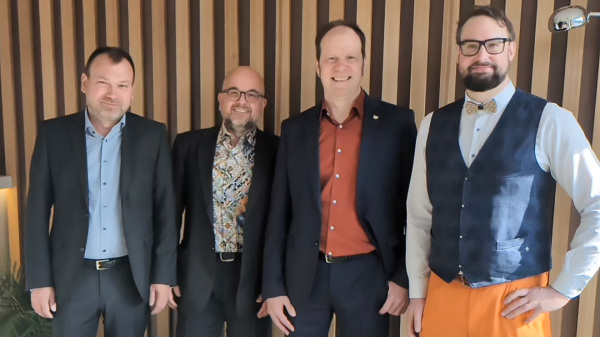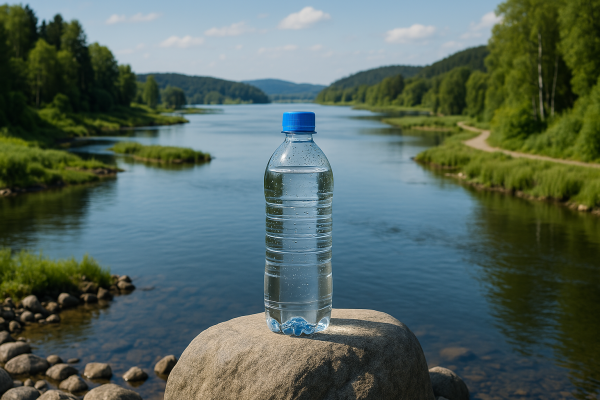Environmental Metagenomics
Environmental Metagenomics
Prof. Dr. Alexander Probst
Welcome to ...
... the department
Environmental Metagenomics
as part of the Research Center One Health Ruhr of the Research Alliance Ruhr.
The Research Alliance Ruhr was founded by the University of Duisburg-Essen, the Ruhr University Bochum, and the Technical University of Dortmund to address pressing scientific issues of the future.





NEWS

IQ-Wasser funded by Federal Ministry of Education and Research (BMBF) Exploring the use of AI in water monitoring
[28-01-2025] Biodiversity and water quality are strongly interconnected. The newly funded IQ-Wasser: KI & Biodiversität project will link artificial intelligence (AI) alghorithms to predict biodiversity changes in riverdam-mediated drinking water reservoirs in Germany to evaluate the effects on drinking water quality. As leader of the subproject Microbial diversity and ecology, Julia Nuy from our lab is contributing to this groundbreaking initiative disclosing ecosystem functions and pathogenicty potential of the microbial community.

PhD Completed Congratulations to our colleague Manan Shah
[26.02.2025] For successfully defending his PhD! Dr. Shah recently joined the lab as a Bioinformatician. Great to have you with us.
The title of the thesis was:
"Hidden Signals: Employing Taxonomy and Functions to Reveal Freshwater Ecosystem Resilience Using Meta-Omics Methods"

Talks at VAAM 2025 Successful Representation at VAAM 2025
[27-03-2025] Environmental Microbiology was strongly represented at VAAM 2025, with several members of our group in attendance. Joern and Kathi delivered insightful presentations showcasing their research, while Alex and Cristina contributed to the conference by chairing various sessions.
We’re proud of our team’s active participation and the visibility of our research at this important microbiology meeting!
Research Projects

Archean Park Archean Park: Relics of Ancient Cellular Biochemistry in High-CO2 Subsurface Ecosystems
The Archean Park project aims to investigate how microbial life functioned under early Earth conditions, particularly in high-CO₂ and oxygen-free environments. The goal is to uncover ancient metabolic pathways that supported carbon cycling in these extreme settings. By integrating deep drilling, genomics, biochemistry, and geochemistry, the project seeks to reconstruct early microbial ecosystems. Insights from this work may inform modern biotechnology and enhance our understanding of Earth's early climate and life.

Proposed Cluster of Excellence REASONS: River ecosystems in the Anthropocene
Rising temperatures, antibiotic residues, droughts and flooding: worldwide, rivers are increasingly under pressure. To prepare them for the challenges of the future, researchers from the proposed Cluster of Excellence REASONS are developing a new, sustainable concept for the management of freshwater ecosystems.

DFG Funded CRC RESIST: Collaborative Research Centre on multiple stressors affecting streams and rivers
RESIST aims to unravel the interactions of multiple stressors in rivers. With manipulative lab and field experiments, field studies and models we will test why, when and how stressors interact – and develop options for mitigation and restoration.
Project A01
Direct and indirect effects of multiple stressors in freshwater ecosystems on microbial parasites and scavengers
More Info
Project A22
Viral (and host) microdiversity response to multiple stressors in freshwater ecosystems
More Info
Project Z-INF
Data management and integration
More Info

US Department of Energy GENIAL
Algae are important organisms on planet Earth as they transform carbon dioxide into organic matter fueling the food chain in freshwater ecosystems. They are extremely diverse in nature and often associate with other organisms like bacteria that help them to acquire nutrients like nitrogen compounds. With the help of JGI’s (Department of Energy, USA) Community Science Project (CSP), project GENIAL will aim at unraveling the evolution of carbon turnover modes of algae and their interaction with other organisms like bacteria or viruses for acquiring cellular nitrogen. The basis for our work will be deciphering the DNA and RNA sequences of more than one hundred algae (and their partners) which will be used for predicting their capabilities and their evolution from their genomes. To do this, we will work with the Central Collection of Algal Cultures (CCAC) at the University of Duisburg-Essen (UDE), one of the world’s largest freshwater algae collections, along with a large network of collaborators at UDE, Germany and around the world.

BMBF BIOSTABIL for Water Security
The BIOSTABIL project aims to implement the concept of biologically stable drinking water along the entire distribution path from the water treatment plant to the consumer. The project seeks to create the foundation for a sustainable and resilient water supply under the changing conditions introduced by climate change. As part of this, we contribute microbiome analyses that support and enhance biological stability. Our mission in this project aims to investigate microbiomes that play a key role in ensuring biological stability.
Selected Publications
-
Metagenomic analysis of pristine oil sheds new light on the global distribution of microbial genetic repertoire in hydrocarbon-associated ecosystemsIn: microLife Vol. 6 (2025) uqae027Online Full Text: dx.doi.org/ (Open Access)
-
Earth's most needed uncultivated aquatic prokaryotesIn: Water Research Vol. 273 (2025) 122928Online Full Text: dx.doi.org/ (Open Access)
-
The journey to understand previously unknown microbial genesIn: Nature Vol. 626 (2024) Nr. 7998, pp. 267 - 269Online Full Text: dx.doi.org/
-
MicrobioRaman : an open-access web repository for microbiological Raman spectroscopy dataIn: Nature Microbiology (2024) Nr. 9, pp. 1152 - 1156Online Full Text: dx.doi.org/ Online Full Text (Open Access)
-
Marine viruses disperse bidirectionally along the natural water cycleIn: Nature Communications Vol. 14 (2023) Nr. 1, 6354Online Full Text: dx.doi.org/ Online Full Text (Open Access)

